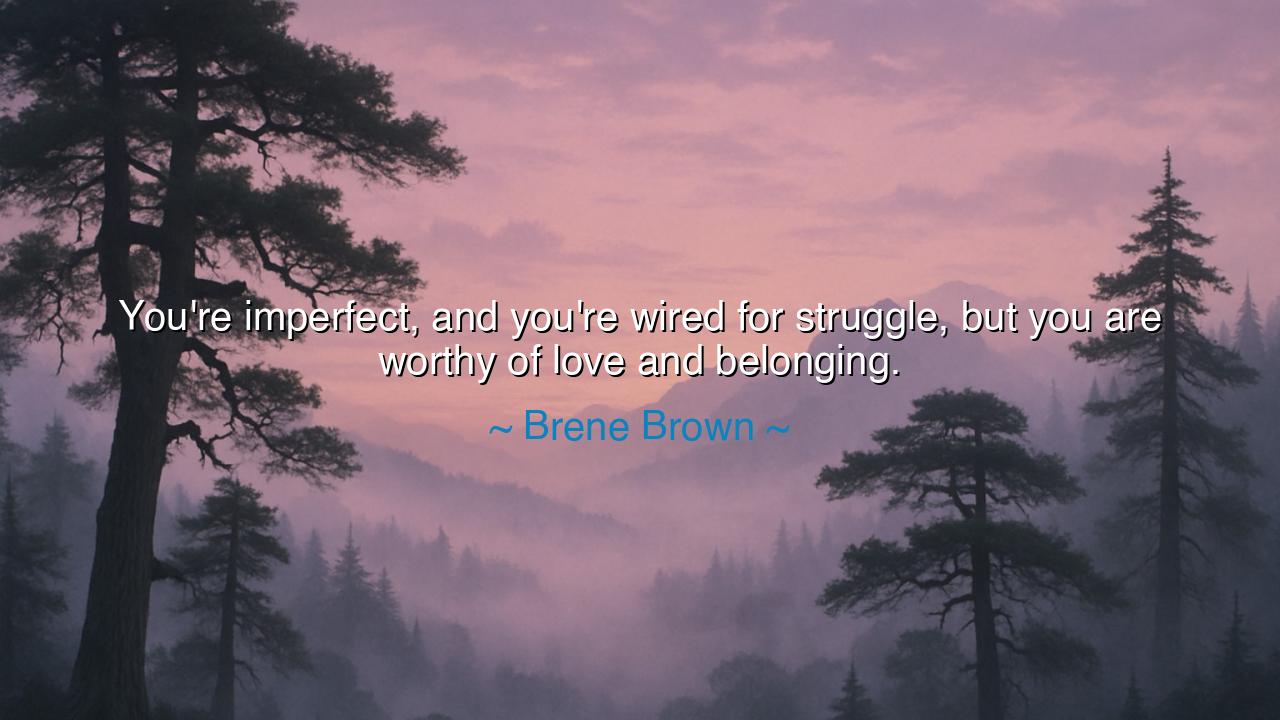
You're imperfect, and you're wired for struggle, but you are
You're imperfect, and you're wired for struggle, but you are worthy of love and belonging.






“You’re imperfect, and you’re wired for struggle, but you are worthy of love and belonging.” Thus spoke Brené Brown, a seeker of truth in the hidden chambers of the human heart. Her words, though born in the age of science and study, carry the cadence of ancient wisdom—the kind that comforts the weary and restores courage to the soul. In this simple declaration, she reveals one of life’s deepest truths: that imperfection is not a curse, but a birthright; that struggle is not failure, but the forge of becoming; and that, despite it all, the human soul remains worthy of love and belonging.
In the ages past, the wise have always known that perfection is not the goal of life, but its illusion. The philosophers of old spoke of balance, of harmony, of accepting one’s nature as part of the divine whole. Yet mankind has long been haunted by its flaws—ever striving to be more than human, ever fearing that weakness makes one unworthy. Brené Brown speaks against this ancient shadow. She reminds us that to be human is to be unfinished, and that the cracks within us are not proof of our unworthiness, but openings through which love can enter.
Her teaching echoes the voice of the ancients who said, “Know thyself.” For when one truly knows oneself—not the mask, not the pretense, but the raw, imperfect truth—then one can finally begin to live in authenticity. It is not through denial or perfection that the soul grows, but through the honesty of vulnerability. To admit one’s flaws is to lay down the armor that separates us from others. It is to say, “I am human, as you are human,” and in that sacred confession, we find connection. Love, after all, is not born in the presence of perfection, but in the meeting of hearts that have both known pain.
Consider the story of Nelson Mandela, who spent twenty-seven years imprisoned for his vision of freedom. The walls that confined him could have hardened his heart, yet he emerged not with bitterness, but with grace. He was not perfect, nor did he claim to be; he had known doubt, anger, and despair. Yet it was his humility and forgiveness, not his perfection, that made him great. Through his struggle, he became a vessel of compassion, proving that our worth is not lost in suffering—it is revealed through it. The chains meant to break him instead became the crucible in which his humanity was refined.
Brown’s insight was born from her study of human emotion, from years spent listening to the stories people hid behind shame. She discovered that those who lived fully, those who loved deeply and dared greatly, shared a single trait: they embraced their imperfection. They did not wait to become flawless before offering their hearts. They believed they were worthy of love and belonging, not because they had earned it, but because they were alive. To live this way is an act of courage. It is to defy the whisper of shame that says, “You are not enough.”
The lesson, then, is this: you were never meant to be perfect. You were meant to be whole—to live, to fall, to rise again, to keep learning what love truly means. Embrace your struggle, for it is the sign that your soul is growing stronger. Do not hide your wounds, for they are the marks of your journey. Instead of chasing the false light of perfection, seek the steady flame of acceptance—the quiet knowing that you are already enough. For it is only when you accept your worth that you can truly give and receive love.
So, my child of the imperfect earth, remember this: you were crafted for struggle, but also for triumph. Do not shrink from the weight of your humanity; carry it with grace. When shame whispers, silence it with truth. When fear says you are unworthy, answer with compassion. Surround yourself with those who see your light even in your darkness. Live openly, forgive often, and love without waiting to be perfect. For as Brené Brown has taught the world, your imperfection does not separate you from love—it is what makes love possible. And when you live in that truth, you will find that belonging was never something to be earned—it was something that was yours all along.






AAdministratorAdministrator
Welcome, honored guests. Please leave a comment, we will respond soon